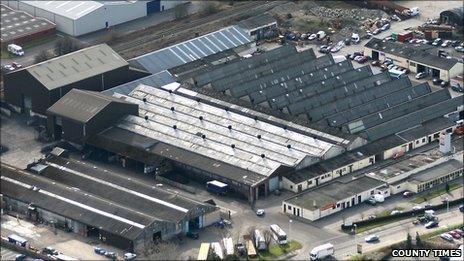Top secret World War II past of Newtown's Lion Works
- Published

The Factory, now known as the Lion Works, employed up to 1,000 women during World War II
It was known simply to its hundreds of wartime workers as The Factory.
It was top secret and hidden from Nazi Germany's Luftwaffe in the heart of the Powys countryside in Newtown.
The government called them shadow factories, and a network of them was built throughout the UK. In Newtown, thousands of aircraft components and submachine gun barrels were made.
Now known as the Lion Works, it is home to a number of business units, but not many in the town are aware of its clandestine past.
Work started on Newtown's covert Air Ministry shadow factory in July 1940, and district council officials had to sign the Official Secrets Act.
It was a crucial period. Britain had just suffered a crushing defeat at the hands of the German army at Dunkirk. In just a few weeks the country would be in the grip of another life of death fight in the Battle of Britain, and many UK cities, where munitions, weapons and aircraft were made, would become a target for Adolf Hitler's bombs.
Local historian Brian Poole has been researching the history of the The Factory for four years.
He said Newtown was chosen as a location for two reasons - it was not a bombing target and there was an excess of female labour.
Accles and Pollock, based in Oldbury in the West Midlands, were brought in to manufacture the products in the town. They had a factory in Oldbury and another in Kidderminster, Worcestershire.
Production started in January 1942, and there would soon be two shifts of 800 workers, some from as far afield as the south Wales valleys. For a brief period in 1944 there were three shifts of 1,000 staff.
Mr Poole, a retired college lecturer, said the factory was next to a trunk road and near railway sidings.
He said: "Adjoining buildings included the office and canteen block, with a fire watch tower, gated entry with security guard room, machine repair shops, a surgery, vehicle shops, store, a blacksmith and boiler house."
He explained how workers made tubular steel which was sent to aircraft assembly lines and used to cradle engines on planes such as the Barracuda. Other components for the famous Spitfire and Hurricane fighter aircraft were produced, along with rifle barrels for the Sten submachine gun.
"The foremen at the Newtown factory were from Oldbury, but the bulk of the labour force were ladies," Mr Poole said.
'Not to talk'
"They were known as directed labour and were, in effect, called up."
Women from the town were joined by others from around Powys, and women from the south Wales valleys, who were housed in a converted wool mill nearby.
Mr Poole said Accles and Pollock started by recruiting women under 30, but those with children aged under 10 were excluded.
But as demand for the firm's products increased they needed more staff and eventually built a children's nursery and employed women up to 50 years old.
"Some women became very skilled, but they were only taught one particular skill, such as welding," Mr Poole said.
"They were told not to talk about what they did and often didn't realise what was happening in other areas of the factory."
Mr Poole said after the war The Factory enjoyed a new lease of life as a bicycle manufacturer, and by the 1960s it was owned by another company producing coal mining pit props and car parts.
The Lion Works, as it became known, was eventually broken up into small units and now it is home to a variety of businesses, including a coal merchant, a car dealership and a musical instrument store.
"Pulling this altogether has been like piecing together a whacking great jigsaw," said Mr Poole.
"It's taken me about four years and I'm still learning things about it.
"Over the years I've spoken to many people who worked there during the war, but who have now sadly died. I've also had access to Accles and Pollock's archives."
He said little was known about wartime shadow factories in the UK, but there were others in Wales at Llanfoist, near Abergavenny, Swansea and Beaumaris on Anglesey, carrying out a variety of tasks.